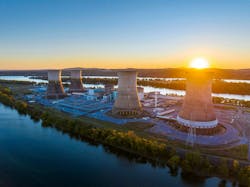Powering AI: Google, Blackstone, and Constellation Pour Billions Into Pennsylvania’s Grid
The largest power purchase agreement for hydropower ever reached was announced last week as part of Google’s $28 billion commitment to AI infrastructure. The centerpiece is a $3 billion, 20-year power purchase agreement (PPA) with Brookfield Asset Management, securing carbon-free electricity from two of Brookfield’s hydroelectric plants in Pennsylvania. This energy will support Google’s expanding infrastructure footprint in the PJM Interconnection region.
PJM is the largest regional transmission organization in the United States, managing the electric grid and wholesale electricity market for more than 65 million people across 13 states and the District of Columbia. The region includes some of the nation’s most data center-dense corridors, making grid reliability and energy availability critical to future AI development.
According to Brookfield, the agreement is part of a broader Hydro Framework Agreement (HFA), a first-of-its-kind structure that aims to deliver 3 gigawatts of carbon-free hydropower across the U.S. The initiative will begin with 670 megawatts sourced from the two Pennsylvania plants. The $3 billion investment will fund modernization, overhauls, and relicensing of the plants, extending their operational life and enabling increased output. Brookfield’s long-term goal is to expand the capacity of the two plants to deliver no less than 3 GW of hydropower.
According to Connor Teskey, President of Brookfield Asset Management:
Our partnership with Google demonstrates the critical role that hydropower can play in helping hyperscale customers meet their energy goals. Delivering power at scale and from a range of sources will be required to meet the growing electricity demands from digitalization and artificial intelligence.
PJM has frequently appeared in data center industry headlines due to ongoing concerns about its ability to deliver sufficient power to both existing facilities and planned infrastructure projects. Google's $3 billion hydropower agreement, and its broader plan to invest $25 billion in AI infrastructure across the region over the next two years, represents a significant step toward easing those concerns and reinforcing grid capacity for future development.
Google's Head of Data Center Energy, Amanda Peterson Corio, described the partnership:
At Google, we’re dedicated to responsibly growing the digital infrastructure that powers daily life for people, communities and businesses. This collaboration with Brookfield is a significant step forward, ensuring clean energy supply in the PJM region where we operate. Hydropower is a proven, low-cost technology, offering dependable, homegrown, carbon-free electricity that creates jobs and builds a stronger grid for all.
The announcement was made on July 15 at the Pennsylvania Energy and Innovation Summit, held at Carnegie Mellon University in Pittsburgh. The event was attended by senior government officials, including Pennsylvania Governor Josh Shapiro and President Donald Trump.
Expanding upon Corio’s remarks, Ruth Porat, Alphabet’s Chief Investment Officer, said in a statement:
Google’s investments announced today will increase energy abundance and empower Americans with the skills needed to thrive in the AI era. We support President Trump’s clear and urgent direction that our nation invest in AI infrastructure, technology, and the energy to unlock its benefits.
Blackstone Makes Its Own $25 Billion Investment In PA
Meanwhile, Blackstone is leading a $25 billion investment initiative in Pennsylvania focused on infrastructure and energy development to support digital and AI growth. The plan combines data center expansion, new natural gas generation capacity, and streamlined permitting processes. Spanning a projected 10-year construction period, the initiative is expected to unlock as much as $60 billion in additional regional development.
Nadeem Meghji, Blackstone’s Global Co-Head of Real Estate, pointed out how these plans align with Blackstone’s ongoing efforts, saying:
This announcement is reflective of Blackstone’s track record of partnering with governments, local communities and customers to create win-win-win outcomes. As the leading global investor in data centers, we are excited to help advance the nation’s digital infrastructure goals.
Data center development under the Blackstone initiative will be led by QTS, one of the world’s largest independent data center operators and a Blackstone-backed company. QTS has already secured multiple build sites across northeastern Pennsylvania and plans to issue a request for information (RFI) to identify additional expansion opportunities throughout the state.
To support the power demands of these facilities, Blackstone has partnered with Allentown-based utility PPL to invest in new natural gas generation capacity tailored to AI and industrial workloads. Pennsylvania, which supplies approximately 20% of the nation’s natural gas, offers a reliable, low-cost electricity supply, making it a strategic asset for digital infrastructure growth.
According to Sean Klimczak, Blackstone’s Global Head of Infrastructure:
Pennsylvania is transforming into a strategic hub for AI innovation, and we’re excited to work with our partners at PPL to invest in the generation needed to support this critical digital infrastructure.
To help ensure community support for development, Blackstone and QTS plan to engage in local initiatives and volunteer efforts aligned with regional priorities. At the same time, they aim to accelerate project timelines by leveraging Pennsylvania’s “Fast Track” permitting system.
Constellation Expands Nuclear and Clean Energy Investment
Also at the summit, Constellation Energy announced a series of clean energy projects totaling billions of dollars in new investment across Pennsylvania. The centerpiece is the revival of the former Three Mile Island facility, now rebranded as the Crane Clean Energy Center. Thanks to coordinated efforts by state and local officials alongside the Federal Energy Regulatory Commission, the project timeline has been accelerated, with the reactor now expected to return to service in 2027, roughly a year ahead of schedule. Once operational, the plant is expected to add approximately 835 MW of clean, reliable energy to the regional grid. Microsoft has already committed as a customer.
Constellation is also pursuing expansion at its Limerick Clean Energy Center, where it is seeking customer commitments to support an additional 340 MW of capacity. In parallel, the company is working with the Nuclear Regulatory Commission to renew the operating license of its Peach Bottom facility, with the goal of extending operations through 2054.
Joe Dominguez, President and CEO of Constellation, said:
These investments will help power innovation in AI and other industries that will define the future for Pennsylvania and all Americans. We commend state and federal leaders for helping to make these investments possible and for recognizing the unique value of reliable and safe nuclear energy to power our economy and bolster our nation’s energy security. Constellation’s acquisition of Calpine will further accelerate our investments, establishing a coast-to-coast platform capable of supporting growing demand for around-the-clock, sustainable power.
CoreWeave Stakes Out AI-Driven Demand in Pennsylvania
Last but not least, also at the summit, CoreWeave announced plans to invest over $6 billion in a new purpose-built AI data center campus in Lancaster, Pennsylvania. The facility will launch with an initial capacity of 100 MW and is designed to scale to 300 MW, placing it among the largest AI-specific data centers in the region. As with other CoreWeave projects, the company will operate as a tenant, with the site being developed by Chirisa Technology Parks in collaboration with Machine Investment Group.
With this level of scale, CoreWeave’s project underscores the urgent need for abundant, scalable power to support AI infrastructure in Pennsylvania. Its location in the PJM region aligns with the broader wave of energy investments, including hydropower, nuclear, and new natural gas generation, announced at the summit.
About the project, Michael Intrator, Co-Founder, Chairman of the Board, and Chief Executive Officer of CoreWeave, said:
The demand for high-performance AI compute is relentless, and CoreWeave is scaling a cloud purpose-built for AI to meet it and strengthen US leadership. This data center will accelerate innovation and drive economic growth across the region.
Laying the Foundation for a Grid-Ready AI Future
As hyperscale AI workloads surge and the U.S. enters a new era of compute intensity, the announcements at the Pennsylvania Energy & Innovation Summit send a clear market signal: energy is the cornerstone of AI infrastructure growth.
With Google, Blackstone, Constellation, and CoreWeave committing billions, Pennsylvania is emerging as a model for aligning digital infrastructure expansion with power sector transformation. From reviving legacy nuclear plants to securing long-term hydropower agreements and developing new natural gas generation, the state’s energy mix is evolving to deliver capacity, flexibility, reliability, and carbon-conscious scale.
All of this activity unfolds within the PJM Interconnection, where grid interconnection queues and transmission constraints have challenged data center developers. These new investments, structured around long-term commitments and public-private partnerships, demonstrate that AI infrastructure growth depends on power that is real, predictable, and future-ready.
With QTS securing sites, CoreWeave scaling up to 300 MW, and Microsoft committing to clean nuclear baseload, these projects are concrete examples of the evolving AI infrastructure landscape.
For data center operators, energy investors, and policymakers, Pennsylvania’s strategy offers a glimpse of the future of AI-powered regions. As AI’s infrastructure demands grow, strategic grid investments will increasingly define competitive advantage.
About the Author



